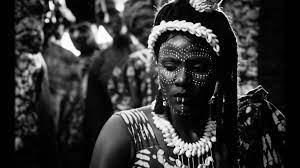169 total views, 1 views today
Mami Wata 2023 Movie Review
Mami Wata is a multifaceted figure whose personae is as diverse as the diaspora that venerates her. A patroness of beauty, money, and all things that ebb and flow, she’s sometimes depicted as being half-woman, half-fish. At other times, she’s shown with a gigantic serpent wrapped around her shoulders. She’s a relatively new deity who arose between the 15th and 20th centuries, a period when Africa became heavily involved in global trade. Her name comes from pidgin English, the language of commerce, and translates as “Mother Water.” She’s a water spirit, ruling over the seas that separated captive Africans from their homes and brought foreign people and influences to African shores, and she can be as benevolent or as cruel as the ocean itself.
The Nigerian film “Mami Wata,” which bills itself as “a West Afrikan folklore,” engages with the spirit in a number of ways. The story takes place in an isolated village called Iyi where, as a title card informs us at the beginning of the movie, “fewer assumptions exist” about Mami Wata than in other places. Her reputation as a “capitalist deity” is key to the plot of the film, which takes place during a period of change as tumultuous as the one that gave rise to Mami Wata herself. But that’s later on. First, the water.
Cinematographer Lílis Soares and writer-director C.J. “Fiery” Obasi craft a breathtaking array of compositions, textures, and tones using water and beaches in “Mami Wata.” In one shot, the ocean looks like textured stained glass. In another, drops of water glisten off of a man’s forehead like a constellation of tiny stars. A seashore at night evokes a completely different mood than that same location under the noonday sun, and Obasi can change the tone of a scene by tilting the camera so the horizon cuts across a different part of the frame. The man-made world retains a patina of magic in “Mami Wata” as well, as Obasi uses strong directional lighting to create artificial horizons on walls and across his actors’ faces. Even better, all of this is done in expressionistic black and white.
Similar care is put into the film’s majestic sculptural hairstyles, stylized makeups, and creative costuming. (The latter makes use of fabrics printed with bold, repeating geometric patterns, which Obasi incorporates into his compositions in eye-catching ways.) Costume designer Bunmi Demiola Fashina, key makeup artist Campbell Precious Arebamen, and key hair stylist Adefunke Olowu receive their own title cards in the end credits alongside the film’s stars and above-the-line crew — a spotlight that doesn’t always shine on hair and makeup artists in particular, but is well deserved here.
The story is a symbolically loaded tale of feminine authority under assault by masculine rapaciousness, centered on a powerful priestess named Mama Efe (Rita Edochie) and her two daughters, Zinwe (Uzoamaka Aniunoh) and Prisca (Evelyne Ily Juhen). There’s more than a touch of Shakespeare in these characters, who are burdened by their obligations and take the pursuit of power — divine or otherwise — very seriously. The most interesting of the bunch is Prisca, who is not Mama Efe’s biological daughter but is the more dutiful protegé nonetheless. (Juhen is also the most compelling performer in the film, exuding an effortless sensuality that ties her character to the goddess that her family serves.) Zinwe is supposed to take over once her mother can no longer serve as an intermediary between Mami Wata and the people of Ily. But she’s been away, and is no longer in tune with what the village needs.
Their regime may not last long enough to have a succession crisis, anyway. A young boy recently died of a virus in Ily despite Mama Efe’s healing intervention, and her assurances that this is the will of Mami Wata are no longer enough to pacify the villagers. They want amenities like electricity and hospitals (it’s not clear when “Mami Wata” is set, but the presence of these things implies that it’s close enough to our present), and their patience with Mama Efe’s cautious approach to modernization is running out. Enter Jasper (Emeka Amakeze), a defector from a nearby rebel army who drifts into Ily and sees an opportunity to take power for himself.
The resulting conflict pits matriarchy against patriarchy and traditional against modern, with Prisca and Zinwe caught in the middle. At times, the drama in “Mami Wata” can be stiff, as can the action choreography. But given that it’s a revenge fantasy that revolves around a Shakespearean power struggle, a little formality doesn’t hurt the movie all that much. (More confusing is a late-in-the-game reveal that throws a hand grenade into the film’s already volatile gender politics.) Without giving away too much, by the time Prisca fully embraces her destiny, any nods to naturalism would be wholly out of place as “Mami Wata” ascends to the status of myth.
“Mami Wata” is a historical first for Sundance. It’s the first homegrown Nigerian film to debut at the festival, the culmination of a five-year process that’s taken Obasi and his wife/producer Oge Obasi to workshops and labs around Africa and Europe, including a slot at Final Cut in Venice in 2021. The extra time spent developing the film pays off on screen: From its opening title design to the last notes of Tunde Jegede’s score, “Mami Wata” is a work of art.
